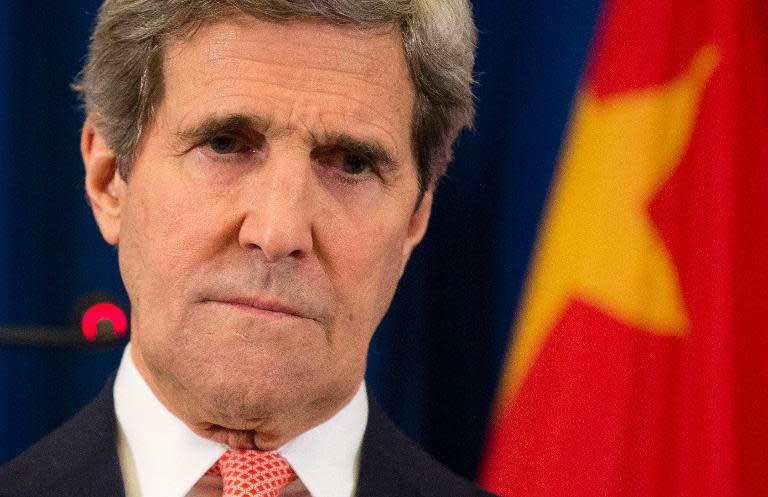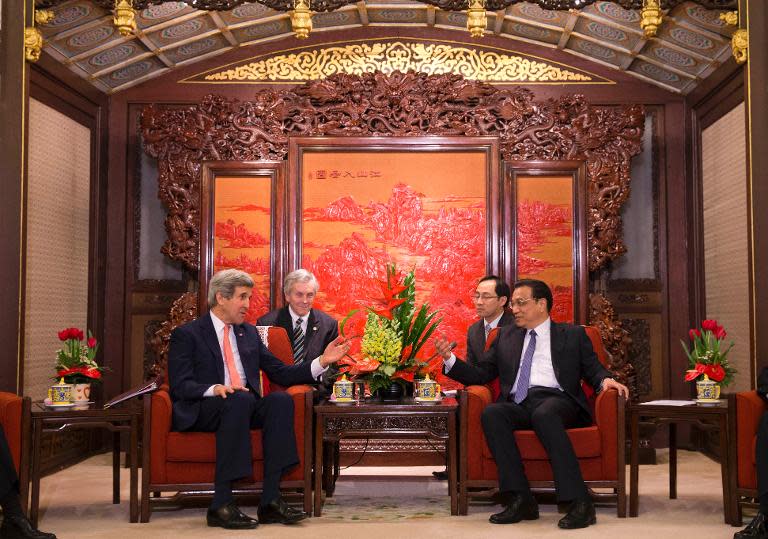China to help push N. Korea back to nuclear talks: Kerry
US Secretary of State John Kerry said Friday he had won China's commitment to do more to prod North Korea to rein in its nuclear programme, on a trip seeking to defuse heightened regional tensions. After talks with senior Chinese leaders including President Xi Jinping, Premier Li Keqiang and Foreign Minister Wang Yi, Kerry stressed he had also highlighted the need to ease concerns over Beijing's territorial ambitions and warned against any moves to declare a new air defence zone. The top US diplomat's trip comes at a pivotal moment with simmering disputes between Beijing and Tokyo over their World War II history and disputed islands in the East China Sea sending relations between the Asian powers plummeting to their lowest point in recent years. North Korea was high on the agenda, with both sides putting specific ideas on the table on how to nudge Beijing's belligerent ally to take concrete steps towards denuclearisation. "China could not have been more emphatic or made it more clear that they will not allow a nuclear programme over the long run," Kerry told reporters at the end of a day of talks. "They also will not allow instability and war to break out in the region," he added, warnings Beijing was prepared to "take additional steps" if Pyongyang does not comply. The top US diplomat did not spell out what steps were mentioned, although he said they were talking about "specifics," but Beijing has tight economic and commercial links with its ally Pyongyang. - 'No chaos or war' - Wang said China will never allow any chaos or war on the Korean peninsula, according to the official news agency Xinhua, quoting him saying: "China is serious on this. We not only say so, but do so." Territorial disputes were also a key area of discussion. Washington was deeply angered when Beijing last year declared an air defence identification zone (ADIZ) over the East China Sea which includes disputed islands, saying it could lead to confusion high in the skies. Kerry told reporters he had warned Beijing against any further such moves, amid reports China is considering a similar ADIZ over the South China Sea, where it has competing claims with several countries including the Philippines -- another US security ally. "We've made it very clear that a unilateral, unannounced, unprocessed initiative like that can be very challenging to certain people in the region, and therefore to regional stability," Kerry stressed. Any future such moves should be done "in an open, transparent, accountable way," he said, adding China should meet "the highest standards" of openness "to reduce any possibilities of misinterpretation". His talks had also focused on specific ways to resolve the competing maritime claims which have poisoned relations, and while China agreed it should be done peacefully, Kerry referenced Beijing's belief that it has a "strong claim based on history, based on fact". China's foreign ministry said in a statement that Wang "introduced the history of the East China Sea and South China Sea issues and elaborated on China's firm stance". "No one can shake our determination to safeguard national sovereignty and territorial integrity", the foreign ministry cited Wang as saying. Beijing requires aircraft flying through its ADIZ to identify themselves and maintain communication with Chinese authorities, but the zone is not a claim of sovereignty. Kerry, who arrived in Beijing from Seoul on the second leg of an Asia tour, reiterated Friday that North Korea must take "meaningful, concrete and irreversible steps towards denuclearisation". Chinese state media, however, remained focused on the historical issues at play, with the China Daily newspaper on Friday running an editorial cartoon depicting Japanese Prime Minister Shinzo Abe offering a Valentine's Day rose to a dead kamikaze pilot's skull. The cartoon appeared to be a reference to a recent bid by the Japanese city of Minami-Kyushu for World War II kamikaze fighters' farewell letters to be included in a UNESCO world heritage register, a move that drew swift condemnation from Beijing and Seoul.





